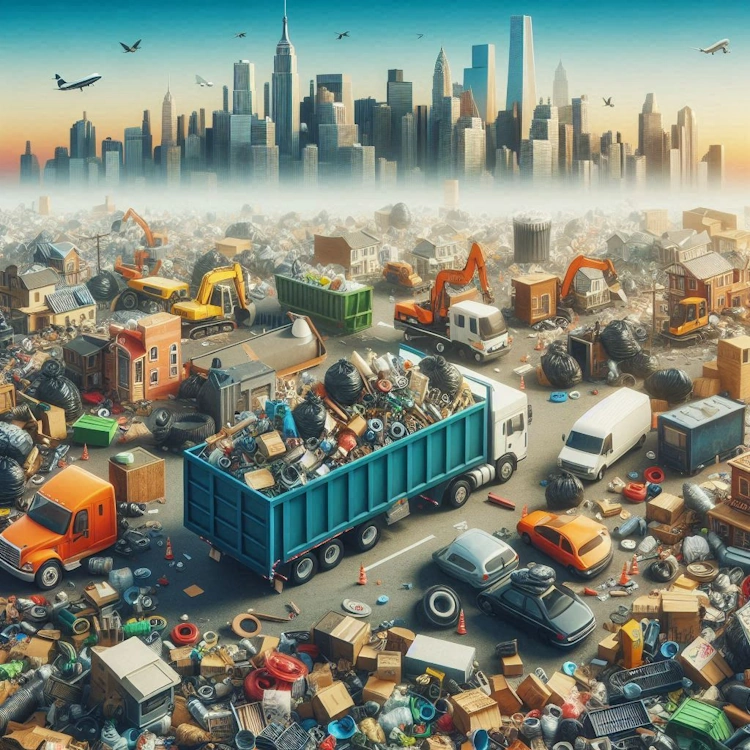
Being the eighth most populous state in the United States, Georgia produces a considerable amount of waste every year and would need a wide-ranging and efficient waste management framework.
Landfills scenically play a key role in this system handling municipal solid waste (MSW) construction and demolish (C&D) debris and industrial waste. State waste disposal facilities may be on their way to a greener future as generators of positive green energy however managing landfills sustainably now is critical to a much larger, sustainable future balancing waste with sustainable development and as a control for environmental and health.
A Brief Overview of Georgia Landfills
Georgia has more than 50 active landfills, as well as many more that are closed or inactive. Defined by embracing waste, which is brought in from the city much like trash, these landfills come in all sizes and services, such as:
- Municipal Solid Waste Landfills: The most common type, which processes garbage from homes and businesses
- Construction and Demolition Debris Landfills: Specific to waste generated from construction and demolition activities
- Industrial Landfills: used for a variety of non-hazardous industry byproducts
The state is also home to several private and regional landfills that take waste from neighboring states. Georgia’s relatively low tipping fees and its abundant landfill capacity makes it an attractive destination for out-of-state waste. It has made the state a regional waste disposal hub for the Southeast.
The state uses modern landfills with environmental protections, like liners and leachate collection systems, to reduce environmental risks to nearby ecosystems. But older, unlined landfills are still a source of worry, particularly in rural areas.
Waste Generation and Disposal Trends
Georgia produces about 14 million tons of solid waste each year. Of this amount, approximately 75 percent goes to landfills, and the rest gets composted, recycled or siphoned off some other way. The state’s recycling rates are at about 25-30%, lower than the national average of 32% which means the state could improve its waste diversion efforts.
Areas of large population densities and economic activity, such as Atlanta, Savannah, and Gainesville, contribute to the greatest amounts of waste. Although rural areas produce less waste, they face barriers to modern waste disposal systems.
Georgia takes in more than 1 million tons of waste from other states, including Florida, Alabama and Tennessee, in addition to its own waste. This practice burdens the state’s landfill capacity and poses further environmental and logistical challenges.
Waste Management Environmental Concerns
Some of the environmental hazards offered by landfills in Georgia include the following: Key concerns include:
- Leachate Management: Groundwater pollution is a serious concern for Georgia due to the state’s heavy reliance on groundwater for its drinking water. Most modern landfills have liners and collection systems to keep contamination from leaking into ground water, but older facilities may allow harmful substances to seep into the water table
- Methane Emissions: Anaerobic decomposition of organic waste in landfills creates methane, a potent greenhouse gas. Even as many of Georgia’s biggest landfills have installed systems to recover gases to capture the methane they emit, smaller or older facilities often don’t
- Deforestation & Habitat Loss: Building new landfills or expanding current landfills can result in deforestation and loss of many natural habitats, especially in rural areas
Georgia Regulatory Oversight
The Georgia Environmental Protection Division (EPD) regulates the conduct of landfills in the state, ensuring compliance with federal and state statutes. These regulations entail maintenance requirements such as:
- World Bank Collection of World Development Indicators
- Groundwater control and air quality monitoring
- Management of leachate and methane gas
Georgia has also enacted measures that promote recycling and waste minimization. For instance, the state prohibits disposal of certain materials, including tires and yard trimmings, in MSW landfills in order to reduce their adverse environmental effects and promote recycling.
Economic and Social Impacts
They are also part of Georgia’s economy, creating jobs and revenues in the way of tipping fees. Anyway, they also pose social problems, especially for communities living close to landfill sites. People living in these neighborhoods often deal with problems like:
- Odor and Noise Pollution: Landfill can release bad odors and attract pests which may cause an unpleasant environment
- Health Concerns: Living near landfills is sometimes associated with respiratory and other health issues, although scientists do not have a complete agreement on their effects
- Ethical Concerns: The proximity of landfills to vulnerable populations can be seen as an ethical issue, where companies prioritize profit over the well-being of local communities
Closed and Legacy Landfills
Georgia has many old landfills that were closed before modern environmental standards. These facilities need to be monitored forever to make sure leachate doesn’t leak and methane gas doesn’t escape. A handful of shuttered landfills have been effectively repositioned for other purposes — as parks, solar farms and wildlife habitats, for instance — but many others are troublesome, with expensive remediation exorbitant.
Looking Ahead: Challenges and Opportunities
Georgia, with its rapid growth, has a landfill system that is up against some challenges:
- Urbanization: Population growth and the growth of urbanization are on track to exponentially increase the amount of waste produced, perhaps overextending existing landfill capacity
- Recycling & Composting: By expanding infrastructure and public education efforts to help improve the state’s recycling and composting rates
- Climate Resilience: Adapting waste-to-energy services to withstand more frequent extreme weather events, including hurricanes and flooding, will be key to their long-term viability
Georgia, however, has an opportunity to improve its solid waste practices in the face of such challenges. Landfill gas-to-energy projects could help reduce methane emissions, while producing renewable energy. Public-private partnerships could also finance improvements to recycling and composting infrastructure, to help divert more waste from landfills.
Landfills continue to be a key component of Georgia’s system to manage waste, which includes not only the waste generated in the state but also the disposal of many tons of waste that come from out of state.
Modern landfills are engineered to prevent environmental contamination, but problems with groundwater on landfill sites, methane gas emissions and adverse impacts to neighbouring communities remain. Georgia need to adopt policies that prioritize waste reduction, reduce recycling programs to ensure sustainability, improve dumpster rental services and address environmental justice concerns to protect the environment and its residents.

